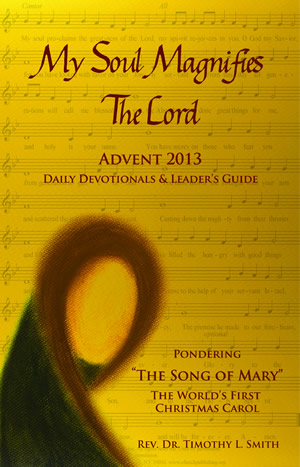
Luke 1:34-35
Serious thinkers about God readily admit that a God we could understand would not be God, because an infinite God is always greater than finite minds can comprehend. So the Scriptures declare God to be unsearchable and unfathomable, dwelling in unapproachable light; as high as the heavens are above the earth so are His ways higher than ours (Romans 11:33; I Timothy 6:16; Isaiah 55:9).
The seasons of Advent and Christmas fill us with awe and wonder, as again we feel like children before the mystery we call God. Has anyone really entered into the meaning of the seasons if one has not asked in wonderment with Mary: “How can this be?” The mystery of Gabriel’s words to Mary defy comprehension: “How can this be, since I am a virgin?”
Mary probably never did understand the miracle of the Virgin Birth, or how God could take on human form. Although Mary was baffled by the angel’s words, she still did not doubt. She refused to box in God. Soon, her elderly cousin Elizabeth, the mother of John the Baptist, will praise Mary’s faith: “Blessed is she who believed that there would be a fulfilment of what was spoken to her by the Lord” (Luke 1:45). Mary believed God. So Mary is not asking Gabriel for a sign, but simply for clarification: “How can this be?”
With delicate and allusive phrasing Gabriel assures Mary: “The Holy Spirit will come upon you…” At the mention of the Holy Spirit Mary’s Biblically formed mind must have gone to the opening words of Scripture, where in the creation story “the Spirit of God moved upon the face of the waters” (Genesis 1:2). As God’s Spirit moved over the primeval void, filling it with light and life, so the Spirit will move upon Mary’s virginal womb with sovereign creative power. As theologian Karl Barth notes about the Virgin Birth, “this is not conception, but creation”.
At the mention of how the Most High, El Elyon, would “overshadow” her, Mary would probably have remembered similar wording from the Israelite’s Exodus journey. There in the wilderness the glory of God’s presence “overshadowed” the Tabernacle and made His dwelling with them (Exodus 40:35, 38). The same God who “overshadowed” the Israelites in the wilderness will “overshadow” Mary.
Because of the creative miracle that God will perform within Mary, the child will be: “holy; he will be called the Son of God”. While there is mystery here, we can know that the Spirit of God will create within Mary a baby who is eternally God, and yet fully human. This Child will be unique in all of creation in that He will be undiminished deity, perfect in His humanity, both of which join in one Person.
How does one define Jesus! How does one contain the uncontainable, or circumscribe the infinite! Through the centuries creeds and church councils have sought to understand and explain Jesus.
The Apostles Creed asserted that Christ is “conceived of the Holy Spirit, born of the Virgin Mary”. The Nicene Creed affirmed faith in Jesus as: “God of God, Light of Light, very God of very God, begotten, not made…” In A.D. 431 the Council of Ephesus was called to reaffirm the Nicene Creed, and to put to rest the heretical teachings of Nestorius. Nestorius taught that Jesus was not truly God, and so rejected the title of “Theotokos” (“Mother of God”) as it was used in Christian liturgy.
Church leaders assembled in Ephesus and condemned Nestorius’ teaching, and reaffirmed Mary as “Theotokos”, the “Mother of God”. In calling Mary the “Mother of God” the Council was expressing the early church’s faith that Mary’s Child was fully human, but also fully God. The title, “Mother of God”, was upheld not so much to exalt Mary, as to uphold both the unity of the divinity and humanity of her Son. Mary was not regarded as the “Mother of God” from eternity, but only with reference to Jesus’ birth in His Incarnation.
In the West, during the first millennium, images of the Madonna and Child were meant to defend the Incarnation, that is, to defend the belief that God really did take human form in the baby born of Mary. “God sent his Son, born of a woman” (Galatians 4:3). An ancient Christian hymn rejoices in the wondrous mystery of the God-Man, fully God, and fully human: “He whom the entire universe could not contain was contained within your womb, O Theotokos.”
PONDERING
- If someone asked you to explain the significance of Mary, what would you say?
- Do you sense the Holy Spirit wanting to do something through you that seems hard to understand, or impossible to believe? If so, what is it?
- Along with today’s Scripture text, take some time to reflect on the wondrous mystery of God taking to Himself human form in John 1:14, 18: “And the Word (God’s Son) became flesh and lived among us, and we have seen his glory, the glory as of a father’s only son, full of grace and truth…No one has ever seen God. It is God the only Son, who is close to the Father’s heart, who has made him known”.



